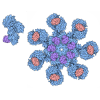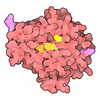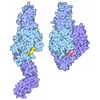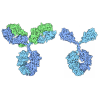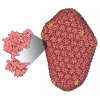+ Open data
Open data
- Basic information
Basic information
| Entry | Database: PDB / ID: 6w7o | ||||||
|---|---|---|---|---|---|---|---|
| Title | Ternary complex structure - BTK cIAP compound 17 | ||||||
 Components Components |
| ||||||
 Keywords Keywords | LIGASE/TRANSFERASE / cIAP E3 PROTAC / LIGASE / LIGASE-TRANSFERASE complex | ||||||
| Function / homology |  Function and homology information Function and homology informationnegative regulation of ripoptosome assembly involved in necroptotic process / FBXO family protein binding / regulation of RIG-I signaling pathway / positive regulation of protein K48-linked ubiquitination / regulation of non-canonical NF-kappaB signal transduction / TNF receptor superfamily (TNFSF) members mediating non-canonical NF-kB pathway / regulation of B cell cytokine production / regulation of necroptotic process / regulation of B cell apoptotic process / positive regulation of protein K63-linked ubiquitination ...negative regulation of ripoptosome assembly involved in necroptotic process / FBXO family protein binding / regulation of RIG-I signaling pathway / positive regulation of protein K48-linked ubiquitination / regulation of non-canonical NF-kappaB signal transduction / TNF receptor superfamily (TNFSF) members mediating non-canonical NF-kB pathway / regulation of B cell cytokine production / regulation of necroptotic process / regulation of B cell apoptotic process / positive regulation of protein K63-linked ubiquitination / monocyte proliferation / positive regulation of interleukin-17A production / regulation of nucleotide-binding domain, leucine rich repeat containing receptor signaling pathway / eosinophil homeostasis / proteoglycan catabolic process / CD40 receptor complex / positive regulation of type III hypersensitivity / B cell affinity maturation / positive regulation of synoviocyte proliferation / histamine secretion by mast cell / neutrophil homeostasis / positive regulation of cGAS/STING signaling pathway / cellular response to molecule of fungal origin / negative regulation of necroptotic process / positive regulation of type I hypersensitivity / XY body / cysteine-type endopeptidase inhibitor activity involved in apoptotic process / MyD88 deficiency (TLR2/4) / non-canonical NF-kappaB signal transduction / cellular response to interleukin-7 / positive regulation of protein monoubiquitination / IRAK4 deficiency (TLR2/4) / TNFR1-induced proapoptotic signaling / MyD88:MAL(TIRAP) cascade initiated on plasma membrane / regulation of reactive oxygen species metabolic process / MyD88-dependent toll-like receptor signaling pathway / RIPK1-mediated regulated necrosis / positive regulation of B cell differentiation / positive regulation of immunoglobulin production / phospholipase activator activity / regulation of toll-like receptor signaling pathway / regulation of innate immune response / negative regulation of interleukin-10 production / Apoptotic cleavage of cellular proteins / negative regulation of B cell proliferation / positive regulation of NLRP3 inflammasome complex assembly / Fc-epsilon receptor signaling pathway / necroptotic process / mesoderm development / phosphatidylinositol-3,4,5-trisphosphate binding / regulation of cell differentiation / B cell activation / canonical NF-kappaB signal transduction / RHO GTPases Activate WASPs and WAVEs / response to cAMP / cell maturation / phospholipase binding / positive regulation of B cell proliferation / FCERI mediated Ca+2 mobilization / Antigen activates B Cell Receptor (BCR) leading to generation of second messengers / peptidyl-tyrosine phosphorylation / positive regulation of phagocytosis / placenta development / ubiquitin binding / TICAM1, RIP1-mediated IKK complex recruitment / positive regulation of protein ubiquitination / tumor necrosis factor-mediated signaling pathway / IKK complex recruitment mediated by RIP1 / B cell receptor signaling pathway / TNFR1-induced NF-kappa-B signaling pathway / non-membrane spanning protein tyrosine kinase activity / cellular response to reactive oxygen species / FCGR3A-mediated phagocytosis / non-specific protein-tyrosine kinase / TNFR2 non-canonical NF-kB pathway / apoptotic signaling pathway / Regulation of TNFR1 signaling / calcium-mediated signaling / NOD1/2 Signaling Pathway / : / RING-type E3 ubiquitin transferase / Regulation of actin dynamics for phagocytic cup formation / positive regulation of interleukin-6 production / Regulation of necroptotic cell death / cytoplasmic side of plasma membrane / protein polyubiquitination / positive regulation of tumor necrosis factor production / ubiquitin-protein transferase activity / G beta:gamma signalling through BTK / ubiquitin protein ligase activity / DAP12 signaling / T cell receptor signaling pathway / G alpha (12/13) signalling events / regulation of cell population proliferation / protein-folding chaperone binding / transferase activity / ER-Phagosome pathway / regulation of inflammatory response / protein tyrosine kinase activity / cytoplasmic vesicle Similarity search - Function | ||||||
| Biological species |  Homo sapiens (human) Homo sapiens (human) | ||||||
| Method |  X-RAY DIFFRACTION / X-RAY DIFFRACTION /  SYNCHROTRON / SYNCHROTRON /  MOLECULAR REPLACEMENT / Resolution: 2.17 Å MOLECULAR REPLACEMENT / Resolution: 2.17 Å | ||||||
 Authors Authors | Calabrese, M.F. / Schiemer, J.S. | ||||||
 Citation Citation |  Journal: Nat.Chem.Biol. / Year: 2020 Journal: Nat.Chem.Biol. / Year: 2020Title: Structural Characterization of BTK:PROTAC:cIAP Ternary Complexes: From Snapshots to Ensembles Authors: Calabrese, M.F. / Schiemer, J.S. / Horst, R. / Meng, Y. / Montgomery, J. / Xu, Y. / Feng, X. / Borzilleri, K. / Uccello, D.P. / Leverett, C. / Brown, S. / Che, Y. / Brown, M.F. / Hayward, M. ...Authors: Calabrese, M.F. / Schiemer, J.S. / Horst, R. / Meng, Y. / Montgomery, J. / Xu, Y. / Feng, X. / Borzilleri, K. / Uccello, D.P. / Leverett, C. / Brown, S. / Che, Y. / Brown, M.F. / Hayward, M.M. / Gilbert, A.M. / Noe, M.C. | ||||||
| History |
|
- Structure visualization
Structure visualization
| Structure viewer | Molecule:  Molmil Molmil Jmol/JSmol Jmol/JSmol |
|---|
- Downloads & links
Downloads & links
- Download
Download
| PDBx/mmCIF format |  6w7o.cif.gz 6w7o.cif.gz | 313.2 KB | Display |  PDBx/mmCIF format PDBx/mmCIF format |
|---|---|---|---|---|
| PDB format |  pdb6w7o.ent.gz pdb6w7o.ent.gz | 252.4 KB | Display |  PDB format PDB format |
| PDBx/mmJSON format |  6w7o.json.gz 6w7o.json.gz | Tree view |  PDBx/mmJSON format PDBx/mmJSON format | |
| Others |  Other downloads Other downloads |
-Validation report
| Arichive directory |  https://data.pdbj.org/pub/pdb/validation_reports/w7/6w7o https://data.pdbj.org/pub/pdb/validation_reports/w7/6w7o ftp://data.pdbj.org/pub/pdb/validation_reports/w7/6w7o ftp://data.pdbj.org/pub/pdb/validation_reports/w7/6w7o | HTTPS FTP |
|---|
-Related structure data
| Related structure data |  6w74C  6w8iC 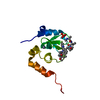 4kmnS 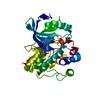 5p9jS C: citing same article ( S: Starting model for refinement |
|---|---|
| Similar structure data |
- Links
Links
- Assembly
Assembly
| Deposited unit | 
| ||||||||
|---|---|---|---|---|---|---|---|---|---|
| 1 | 
| ||||||||
| 2 | 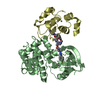
| ||||||||
| Unit cell |
|
- Components
Components
| #1: Protein | Mass: 32112.816 Da / Num. of mol.: 2 Source method: isolated from a genetically manipulated source Source: (gene. exp.)  Homo sapiens (human) / Gene: BTK, AGMX1, ATK, BPK Homo sapiens (human) / Gene: BTK, AGMX1, ATK, BPKProduction host:  Spodoptera aff. frugiperda 2 RZ-2014 (butterflies/moths) Spodoptera aff. frugiperda 2 RZ-2014 (butterflies/moths)References: UniProt: Q06187, non-specific protein-tyrosine kinase #2: Protein | Mass: 11318.731 Da / Num. of mol.: 2 Source method: isolated from a genetically manipulated source Source: (gene. exp.)  Homo sapiens (human) / Gene: BIRC2, API1, MIHB, RNF48 / Production host: Homo sapiens (human) / Gene: BIRC2, API1, MIHB, RNF48 / Production host:  References: UniProt: Q13490, RING-type E3 ubiquitin transferase #3: Chemical | #4: Chemical | #5: Water | ChemComp-HOH / | Has ligand of interest | Y | |
|---|
-Experimental details
-Experiment
| Experiment | Method:  X-RAY DIFFRACTION / Number of used crystals: 1 X-RAY DIFFRACTION / Number of used crystals: 1 |
|---|
- Sample preparation
Sample preparation
| Crystal | Density Matthews: 2.29 Å3/Da / Density % sol: 46.27 % |
|---|---|
| Crystal grow | Temperature: 298 K / Method: vapor diffusion, sitting drop / pH: 6.7 Details: 50 mM ammonium sulfate, 100 mM Bis-Tris pH 6.7, 29% PE15/4 |
-Data collection
| Diffraction | Mean temperature: 100 K / Serial crystal experiment: N |
|---|---|
| Diffraction source | Source:  SYNCHROTRON / Site: SYNCHROTRON / Site:  APS APS  / Beamline: 17-ID / Wavelength: 1 Å / Beamline: 17-ID / Wavelength: 1 Å |
| Detector | Type: DECTRIS PILATUS3 6M / Detector: PIXEL / Date: Feb 26, 2019 |
| Radiation | Protocol: SINGLE WAVELENGTH / Monochromatic (M) / Laue (L): M / Scattering type: x-ray |
| Radiation wavelength | Wavelength: 1 Å / Relative weight: 1 |
| Reflection | Resolution: 2.17→94 Å / Num. obs: 38604 / % possible obs: 94.6 % / Redundancy: 1.8 % / Biso Wilson estimate: 33.06 Å2 / CC1/2: 0.99 / Rmerge(I) obs: 0.078 / Net I/σ(I): 6.8 |
| Reflection shell | Resolution: 2.17→2.18 Å / Num. unique obs: 414 / CC1/2: 0.76 |
- Processing
Processing
| Software |
| |||||||||||||||||||||||||||||||||||||||||||||||||||||||||||||||||||||||||||||||||||||||||||||||||||||||||||||||||||||||||||||
|---|---|---|---|---|---|---|---|---|---|---|---|---|---|---|---|---|---|---|---|---|---|---|---|---|---|---|---|---|---|---|---|---|---|---|---|---|---|---|---|---|---|---|---|---|---|---|---|---|---|---|---|---|---|---|---|---|---|---|---|---|---|---|---|---|---|---|---|---|---|---|---|---|---|---|---|---|---|---|---|---|---|---|---|---|---|---|---|---|---|---|---|---|---|---|---|---|---|---|---|---|---|---|---|---|---|---|---|---|---|---|---|---|---|---|---|---|---|---|---|---|---|---|---|---|---|---|
| Refinement | Method to determine structure:  MOLECULAR REPLACEMENT MOLECULAR REPLACEMENTStarting model: 4KMN; 5P9J Resolution: 2.17→54.34 Å / Cor.coef. Fo:Fc: 0.912 / Cor.coef. Fo:Fc free: 0.873 / SU R Cruickshank DPI: 0.292 / Cross valid method: THROUGHOUT / σ(F): 0 / SU R Blow DPI: 0.294 / SU Rfree Blow DPI: 0.211 / SU Rfree Cruickshank DPI: 0.212
| |||||||||||||||||||||||||||||||||||||||||||||||||||||||||||||||||||||||||||||||||||||||||||||||||||||||||||||||||||||||||||||
| Displacement parameters | Biso max: 121.42 Å2 / Biso mean: 35.9 Å2 / Biso min: 9.56 Å2
| |||||||||||||||||||||||||||||||||||||||||||||||||||||||||||||||||||||||||||||||||||||||||||||||||||||||||||||||||||||||||||||
| Refine analyze | Luzzati coordinate error obs: 0.29 Å | |||||||||||||||||||||||||||||||||||||||||||||||||||||||||||||||||||||||||||||||||||||||||||||||||||||||||||||||||||||||||||||
| Refinement step | Cycle: final / Resolution: 2.17→54.34 Å
| |||||||||||||||||||||||||||||||||||||||||||||||||||||||||||||||||||||||||||||||||||||||||||||||||||||||||||||||||||||||||||||
| Refine LS restraints |
| |||||||||||||||||||||||||||||||||||||||||||||||||||||||||||||||||||||||||||||||||||||||||||||||||||||||||||||||||||||||||||||
| LS refinement shell | Resolution: 2.17→2.247 Å / Rfactor Rfree error: 0
| |||||||||||||||||||||||||||||||||||||||||||||||||||||||||||||||||||||||||||||||||||||||||||||||||||||||||||||||||||||||||||||
| Refinement TLS params. | Method: refined / Refine-ID: X-RAY DIFFRACTION
| |||||||||||||||||||||||||||||||||||||||||||||||||||||||||||||||||||||||||||||||||||||||||||||||||||||||||||||||||||||||||||||
| Refinement TLS group |
|
 Movie
Movie Controller
Controller



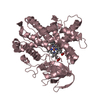
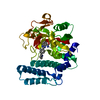
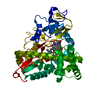
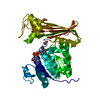

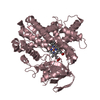
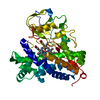
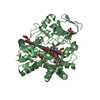
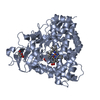
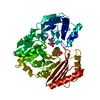
 PDBj
PDBj